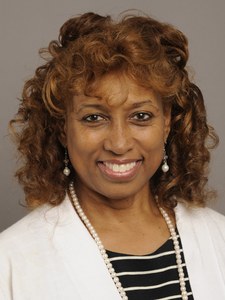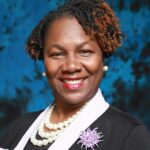By Rev. Dr. Angelique Walker-Smith
“Bear one another’s burdens, and in this way you will fulfill[a] the law of Christ.” Galatians 6:2
In 1852, Frederick Douglass, a leader in the African Methodist Episcopal Zion Church and a Republican abolitionist, was invited to give a July Fourth speech. His address, “What, to the Slave, is the Fourth of July,” acknowledges the successes of the young democracy that became independent from England. It also offered a courageous challenge to the institution of slavery. The summation below reflects this sentiment: “I do not despair of this country …. The arm of the Lord is not shortened, and the doom of slavery is certain. I, therefore, leave off where I began, with hope. While drawing encouragement from the Declaration of Independence, the great principles it contains, and the genius of American Institutions, my spirit is also cheered by the obvious tendencies of the age.”
Indeed the “doom of slavery” did come in 1863 and 1865 with the signing of the executive order of the Emancipation Proclamation in 1863 and the successive law in 1865. Douglass’ speech became another catalyst for increased advocacy to end the policy of slavery in the United States.
Today, we celebrate Independence Day twice as federal holidays in the United States: July 4 and Juneteenth, June 19, which became a national holiday in 2021. But sadly, the historical contexts of 1776, 1852, 1865, and 2021 did and still do reflect the pain of disproportionate hunger and poverty among people of African descent in the U.S. and Africa. Associate Professor Angela Odoms-Young of Northern Illinois University captures this history: “It really is not surprising when you consider the drivers of food insecurity: Income, employment. It’s also an accumulation of disadvantages that happens. I don’t think people always recognize that accumulation—how disadvantages can accumulate over generations and cause those disparities in wealth.”
Independence matters, but so does interdependence when addressing the drivers of food insecurity, to which Dr. Odoms-Young speaks. The independence of any people and the governance that follows should build interdependence among the people. Interdependence is a biblical concept that undergirds a spirit for collaboration to end challenges like hunger. In the case of Pan-African communities, interdependence invites the recognition of historical and present-day inequities that prevent access to nutritious food and lands to grow nutritious food but also invites collective action.
People of faith are called to create and lead communities of interdependence and collaboration, which is a value of Bread for the World. Advocacy to end hunger is one of the ways to recognize our interdependence and each other. Bread for the World believes there is enough for all. Please join us in advocating together at www.bread.org.
Angelique Walker-Smith is a senior associate for Pan African and Orthodox Church engagement at Bread for the World.





